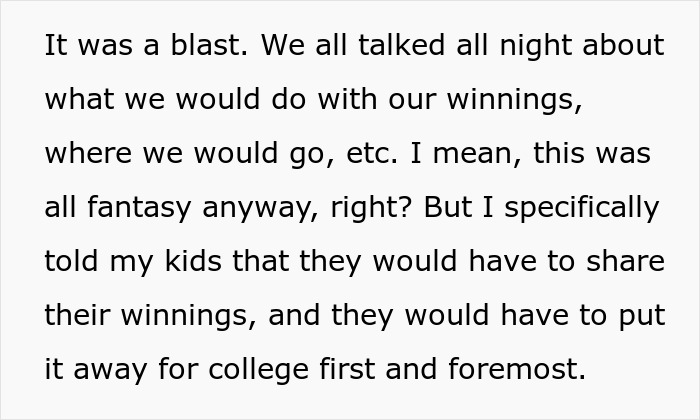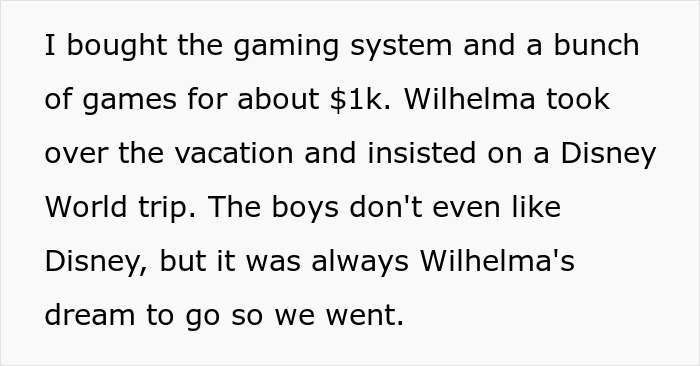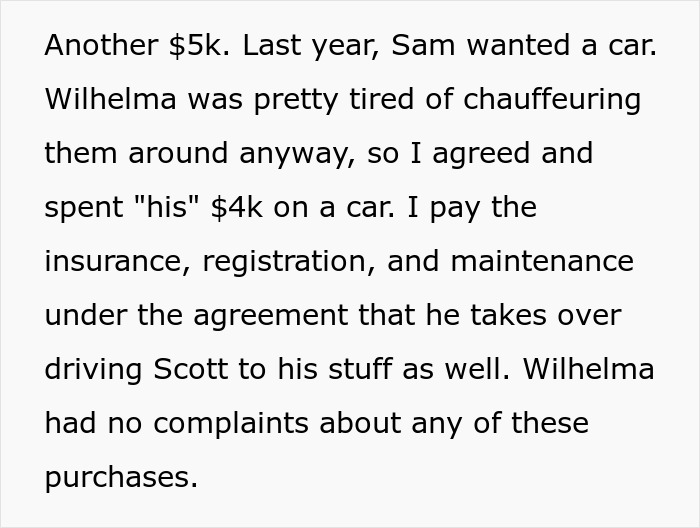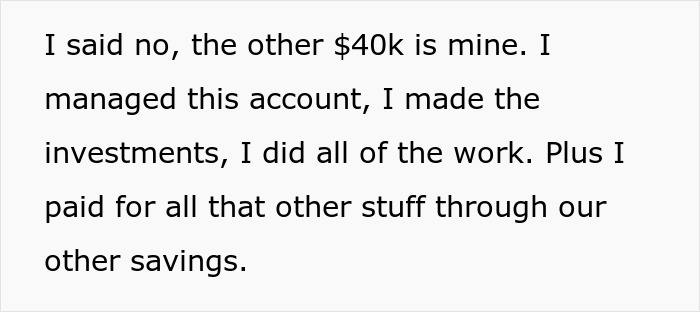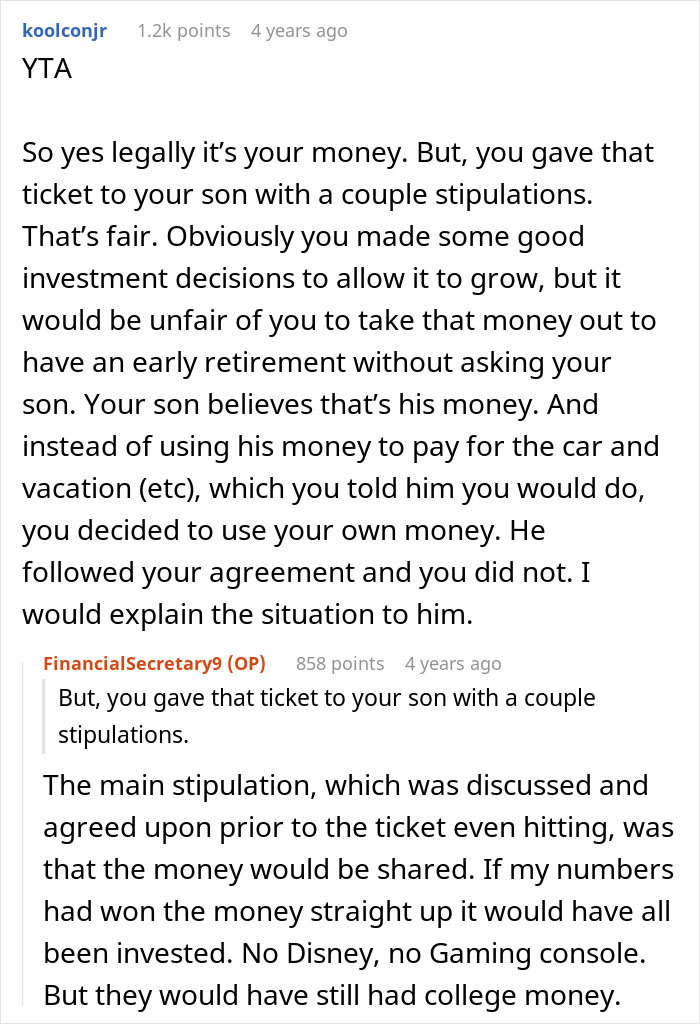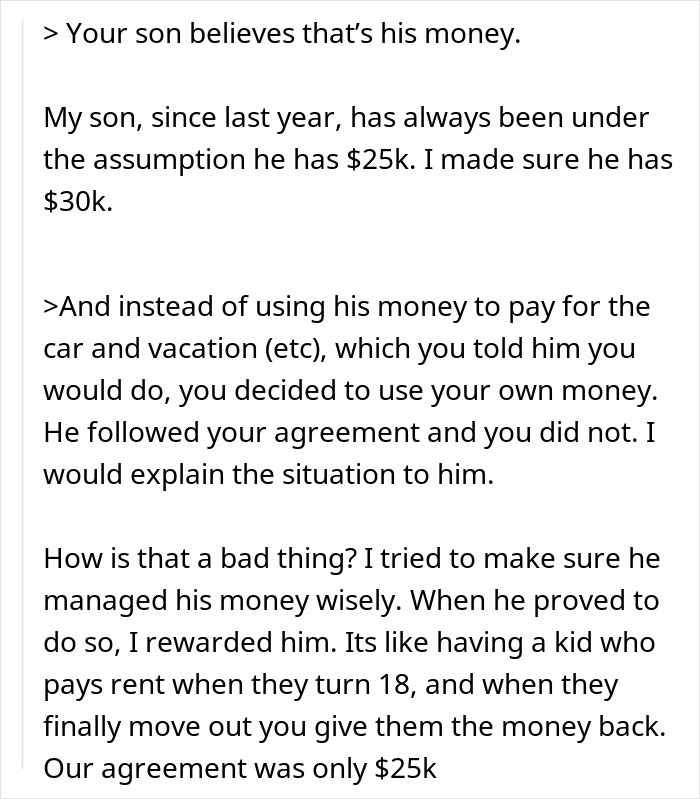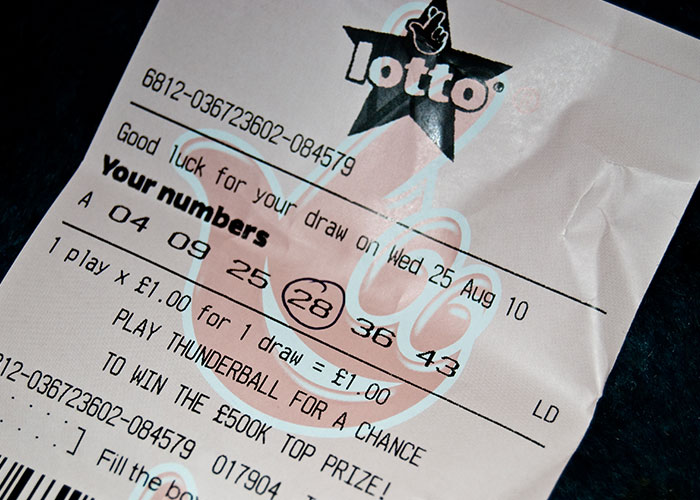Man Invests Son’s Lottery Winnings, Family Drama Ensues As He Decides To Keep $40k For Himself
Managing money and kids is a difficult task, particularly when the children are old enough to think they know how to make decisions. After all, investing, college funds, all quite boring in the face of instant gratification.
A man turned to the internet for advice after a marital disagreement on how he used his son’s “lottery winnings.” After going through a round of lottery tickets as a family, the one his son took won a considerable amount of money. So OP invested it and it ended up paying off. However, some believe he should just give the entire sum to the kid.
It’s questionable to give a teen a huge sum of money without any supervision
Image credits: Iain Watson (not the actual photo)
So one father was second-guessing his choice to invest the money his son “won”
Image credits: Julia M Cameron (not the actual photo)
Image credits: Mikhail Nilov (not the actual photo)
Image credits: FinancialSecretary9
Working out who owns what in a family can be difficult
![Man Invests Son’s Lottery Winnings, Family Drama Ensues As He Decides To Keep $40k For Himself Man Invests Son’s Lottery Winnings, Family Drama Ensues As He Decides To Keep $40k For Himself]()
Image credits: Anna Shvets (not the actual photo)
This story manages to cover a very interesting combination of ethical questions. First and foremost, how does ownership work in a family? Obviously, nearly anything a parent buys for a child is, legally, the parent’s property, since most kids don’t have their own income. This is doubly true for something like a lottery ticket, which only the purchasing adult could redeem in the first place.
This is perhaps why many did side with OP. Having different family members scratch off the ticket is fun, but OP, who is legally an adult and bought it, has to be the one to pick up the money. Nevertheless, most parents tend to avoid playing the “Do you know who actually owns things?” card unless it’s absolutely necessary.
First and foremost, it can really drive a wedge between the child and the parent. It’s not like it’s the kid’s fault they don’t have income and this just exacerbates the usual juvenile frustration with not having all the rights and privileges of an adult. As many parents know, it’s even worse when the child in question, like in this story, is a teen.
A college fund is a big deal in the US
![Man Invests Son’s Lottery Winnings, Family Drama Ensues As He Decides To Keep $40k For Himself Man Invests Son’s Lottery Winnings, Family Drama Ensues As He Decides To Keep $40k For Himself]()
Image credits: Pixabay (not the actual photo)
On the other hand, there are some obvious and less obvious reasons for the father to hold onto most of the cash. First and foremost, a college fund is legitimately the main way many young adults avoid being in debt until much later in life. The average annual cost at a private institution in the US was $33,500 in 2017. This was seven years ago, so you can bet your bottom dollar that it’s higher now.
As shocking as it sounds, the entirety of these lottery winnings wouldn’t cover the entire four-year degree, depending on where this young man aimed to go. However, seeing as it’s been invested well, that money has been grown effectively. A college fund is no small deal, it can and will give this young adult a headstart in life which he will only truly understand when discussing people’s college debt a decade later and realizing how lucky he was.
All in all, this money can be a teaching moment for the son
![Man Invests Son’s Lottery Winnings, Family Drama Ensues As He Decides To Keep $40k For Himself Man Invests Son’s Lottery Winnings, Family Drama Ensues As He Decides To Keep $40k For Himself]()
Image credits: Vika Glitter (not the actual photo)
There is also a “hidden” downside of just handing over the money. OP has more than one kid. Anyone with siblings will be well aware that your brother or sister winning the lottery might be the worst thing possible. The jealousy, FOMO, gloating, etc, might cause a lot of inter-familial strain that OP was quite clever about avoiding. Indeed, by spending some of it upfront, he negated the usual downside of investing, the lack of instant gratification.
Of course, the real question is what should he have done with the earnings from investing it. All in all, holding on to them is by no means bad. He quite generously offered to manage the money for his son for free, something that he will struggle to find later in life. It’s also a good way to
OP answered some questions in the comments section
![Man Invests Son’s Lottery Winnings, Family Drama Ensues As He Decides To Keep $40k For Himself Man Invests Son’s Lottery Winnings, Family Drama Ensues As He Decides To Keep $40k For Himself]()
A few readers sided with the father
[ad_2]
Managing money and kids is a difficult task, particularly when the children are old enough to think they know how to make decisions. After all, investing, college funds, all quite boring in the face of instant gratification.
A man turned to the internet for advice after a marital disagreement on how he used his son’s “lottery winnings.” After going through a round of lottery tickets as a family, the one his son took won a considerable amount of money. So OP invested it and it ended up paying off. However, some believe he should just give the entire sum to the kid.
It’s questionable to give a teen a huge sum of money without any supervision
Image credits: Iain Watson (not the actual photo)
So one father was second-guessing his choice to invest the money his son “won”
Image credits: Julia M Cameron (not the actual photo)
Image credits: Mikhail Nilov (not the actual photo)
Image credits: FinancialSecretary9
Working out who owns what in a family can be difficult
![Man Invests Son’s Lottery Winnings, Family Drama Ensues As He Decides To Keep $40k For Himself Man Invests Son’s Lottery Winnings, Family Drama Ensues As He Decides To Keep $40k For Himself]()
Image credits: Anna Shvets (not the actual photo)
This story manages to cover a very interesting combination of ethical questions. First and foremost, how does ownership work in a family? Obviously, nearly anything a parent buys for a child is, legally, the parent’s property, since most kids don’t have their own income. This is doubly true for something like a lottery ticket, which only the purchasing adult could redeem in the first place.
This is perhaps why many did side with OP. Having different family members scratch off the ticket is fun, but OP, who is legally an adult and bought it, has to be the one to pick up the money. Nevertheless, most parents tend to avoid playing the “Do you know who actually owns things?” card unless it’s absolutely necessary.
First and foremost, it can really drive a wedge between the child and the parent. It’s not like it’s the kid’s fault they don’t have income and this just exacerbates the usual juvenile frustration with not having all the rights and privileges of an adult. As many parents know, it’s even worse when the child in question, like in this story, is a teen.
A college fund is a big deal in the US
![Man Invests Son’s Lottery Winnings, Family Drama Ensues As He Decides To Keep $40k For Himself Man Invests Son’s Lottery Winnings, Family Drama Ensues As He Decides To Keep $40k For Himself]()
Image credits: Pixabay (not the actual photo)
On the other hand, there are some obvious and less obvious reasons for the father to hold onto most of the cash. First and foremost, a college fund is legitimately the main way many young adults avoid being in debt until much later in life. The average annual cost at a private institution in the US was $33,500 in 2017. This was seven years ago, so you can bet your bottom dollar that it’s higher now.
As shocking as it sounds, the entirety of these lottery winnings wouldn’t cover the entire four-year degree, depending on where this young man aimed to go. However, seeing as it’s been invested well, that money has been grown effectively. A college fund is no small deal, it can and will give this young adult a headstart in life which he will only truly understand when discussing people’s college debt a decade later and realizing how lucky he was.
All in all, this money can be a teaching moment for the son
![Man Invests Son’s Lottery Winnings, Family Drama Ensues As He Decides To Keep $40k For Himself Man Invests Son’s Lottery Winnings, Family Drama Ensues As He Decides To Keep $40k For Himself]()
Image credits: Vika Glitter (not the actual photo)
There is also a “hidden” downside of just handing over the money. OP has more than one kid. Anyone with siblings will be well aware that your brother or sister winning the lottery might be the worst thing possible. The jealousy, FOMO, gloating, etc, might cause a lot of inter-familial strain that OP was quite clever about avoiding. Indeed, by spending some of it upfront, he negated the usual downside of investing, the lack of instant gratification.
Of course, the real question is what should he have done with the earnings from investing it. All in all, holding on to them is by no means bad. He quite generously offered to manage the money for his son for free, something that he will struggle to find later in life. It’s also a good way to
OP answered some questions in the comments section
![Man Invests Son’s Lottery Winnings, Family Drama Ensues As He Decides To Keep $40k For Himself Man Invests Son’s Lottery Winnings, Family Drama Ensues As He Decides To Keep $40k For Himself]()
A few readers sided with the father
Read original article here


